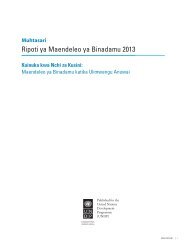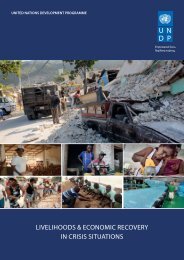Poverty and Human Development Report 2009 - UNDP in Tanzania
Poverty and Human Development Report 2009 - UNDP in Tanzania
Poverty and Human Development Report 2009 - UNDP in Tanzania
You also want an ePaper? Increase the reach of your titles
YUMPU automatically turns print PDFs into web optimized ePapers that Google loves.
evise allocations based on identified local needs. With little locally-generated revenue <strong>and</strong> tight<br />
budgets compared with responsibilities, LGAs still have limited autonomy <strong>in</strong> spend<strong>in</strong>g.<br />
Despite these constra<strong>in</strong>ts, the latest round of the Afrobarometer survey <strong>in</strong> 2008 found that a<br />
majority of citizens were satisfied with government education <strong>and</strong> health services, with more rural<br />
residents express<strong>in</strong>g approval of government efforts <strong>in</strong> these sectors than urban residents. In<br />
contrast, less than half of all respondents were satisfied with water services, reflect<strong>in</strong>g cont<strong>in</strong>ued<br />
low levels of access to clean <strong>and</strong> safe water supplies. Of additional concern, the number of LGAs<br />
with clean audit reports from the National Audit Office dropped from 81% <strong>in</strong> 2006/07 to 54% <strong>in</strong><br />
2007/08, a result partly due to conflict<strong>in</strong>g <strong>in</strong>structions received by LGAs about the preparation of<br />
their accounts. A higher proportion of respondents <strong>in</strong> Afrobarometer 2008 also held the op<strong>in</strong>ion<br />
that local councillors were <strong>in</strong>volved <strong>in</strong> corruption than <strong>in</strong> the previous round of the survey <strong>in</strong><br />
2005. Overall, therefore, the process of strengthen<strong>in</strong>g fiscal autonomy <strong>and</strong> transparency <strong>in</strong><br />
local government authorities <strong>and</strong>, <strong>in</strong> turn, improv<strong>in</strong>g service delivery appears to be progress<strong>in</strong>g<br />
slowly. Of further note, the f<strong>in</strong>ancial management by central government m<strong>in</strong>istries, departments<br />
<strong>and</strong> agencies (MDAs) generally shows improvement over time. The percentage of MDAs which<br />
received a clean (unqualified) audit certificate rose from 34% <strong>in</strong> 2004/05 to 76% <strong>in</strong> 2006/07, but<br />
fell back to 71% <strong>in</strong> 2007/08.<br />
Another important goal of the governance cluster is to improve personal <strong>and</strong> material security<br />
<strong>and</strong> to reduce crime. The Afrobarometer 2008 revealed mixed perceptions on public safety.<br />
Positively, a substantial majority of the citizens surveyed did not fear crime <strong>in</strong> their homes <strong>and</strong><br />
had not experienced theft from their home over the past year. However, the percentages of<br />
respondents who reported trust <strong>in</strong> the police <strong>and</strong> courts of law decl<strong>in</strong>ed between 2005 <strong>and</strong><br />
2008. The proportion of respondents who trusted the police ‘somewhat’ or ‘a lot’ fell from 85%<br />
<strong>in</strong> 2005 to 60% <strong>in</strong> 2008. Similarly, citizens’ level of trust <strong>in</strong> the courts of law (‘somewhat’ or ‘a lot’)<br />
dim<strong>in</strong>ished from 85% <strong>in</strong> 2005 to 73% <strong>in</strong> 2008.<br />
Policy Implications<br />
eXeCUtiVe sUMMarY<br />
The MKUKUTA target to reduce <strong>in</strong>come poverty by half by 2010 is now out of reach, <strong>and</strong> <strong>Tanzania</strong><br />
faces a huge challenge to achieve MDG1 by 2015. To do so annual real consumption growth of<br />
3.2% per capita will be needed, which is four times higher than that achieved between 2000/01<br />
<strong>and</strong> 2007. S<strong>in</strong>ce <strong>Tanzania</strong>’s level of <strong>in</strong>come <strong>in</strong>equality is low, even by <strong>in</strong>ternational st<strong>and</strong>ards,<br />
redistribution of <strong>in</strong>come is not likely to be effective. A strongly focused approach to susta<strong>in</strong><br />
<strong>and</strong> accelerate growth is needed that fully exploits <strong>Tanzania</strong>’s comparative advantages <strong>and</strong><br />
propels domestic employment <strong>and</strong> productivity – <strong>and</strong>, <strong>in</strong> turn, <strong>in</strong>comes <strong>and</strong> consumption levels<br />
– particularly <strong>in</strong> rural areas.<br />
Encourag<strong>in</strong>gly, from a policy perspective, a significant proportion of households have consumption<br />
levels not far below the poverty l<strong>in</strong>e. Households, too, are already diversify<strong>in</strong>g out of agriculture<br />
to improve well-be<strong>in</strong>g. Indeed, diversification of <strong>in</strong>come-generat<strong>in</strong>g activities is occurr<strong>in</strong>g across<br />
all wealth qu<strong>in</strong>tiles. However, the success of households <strong>in</strong> diversification varies markedly. The<br />
least poor households earn approximately eleven times more <strong>in</strong> non-farm self-employment than<br />
xxv





